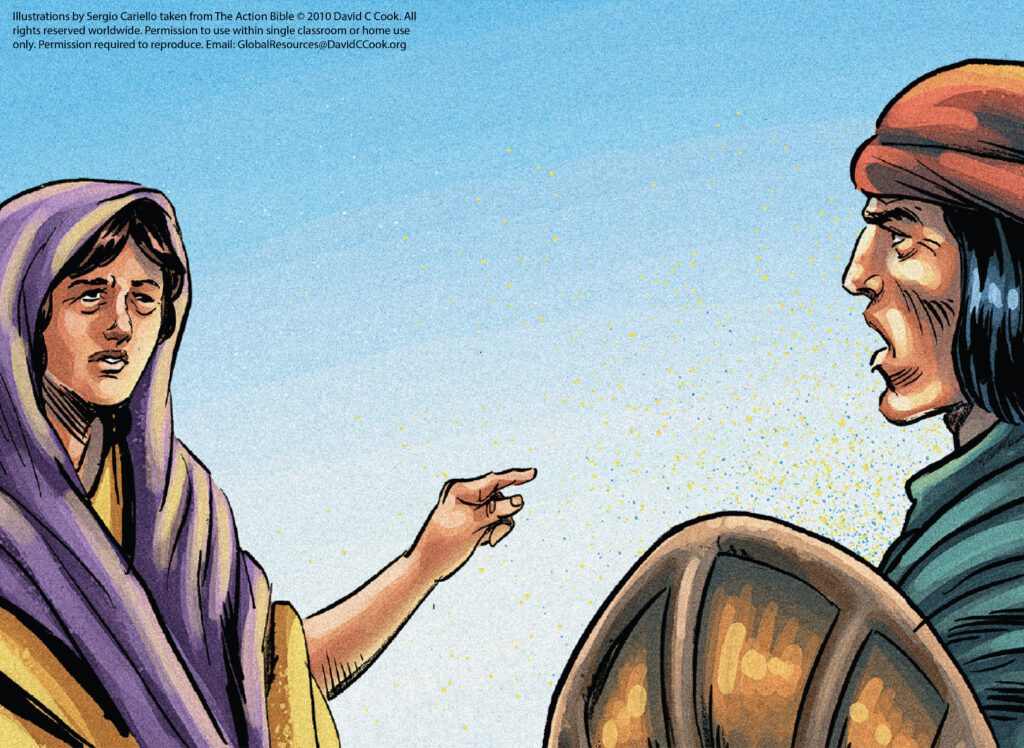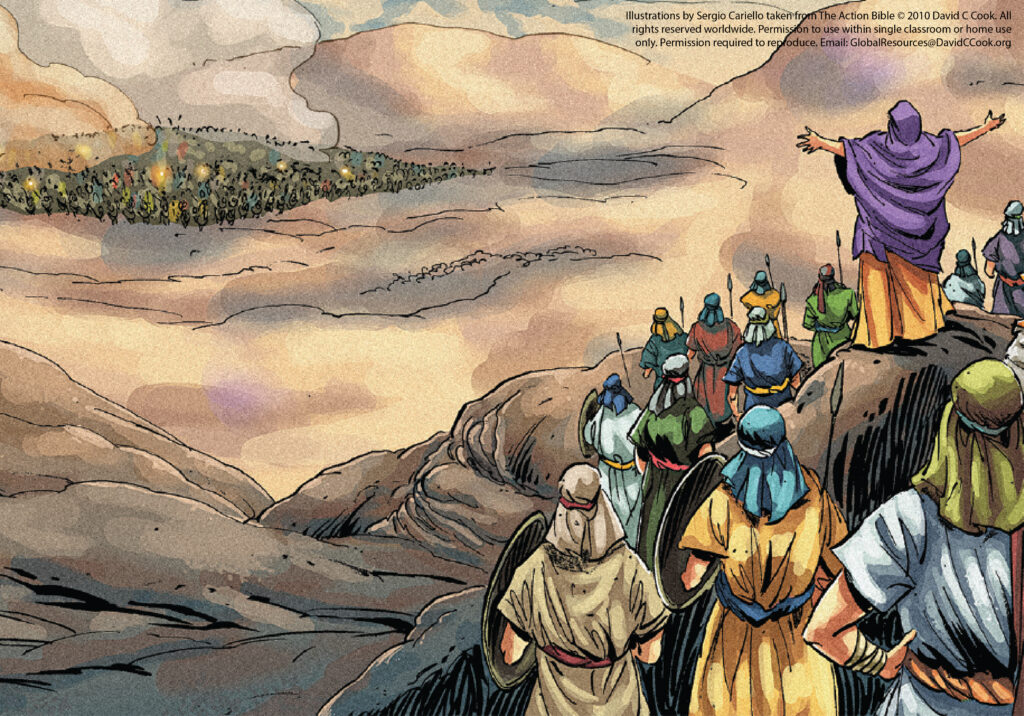During the lesson, the information for you to know is written in regular type, and what we suggest speaking or reading aloud to children is in bold. All resources for this lesson, including the Teacher Guide, Student Page, Family Connection Card, and other resources can be downloaded in a ZIP file by clicking on the following link:
In some lessons you will find "resource articles." These are articles written by experts from around the world to help equip you for your work with children and adolescents. Share them with parents or guardians if you consider it appropriate.
Think of what you were when you were called. Not many of you were wise by human standards; not many were influential; not many were of noble birth. But God chose the foolish things of the world to shame the wise; God chose the weak things of the world to shame the strong. God chose the lowly things of this world and the despised things— and the things that are not—to nullify the things that are, so that no one may boast before him.
1 Corinthians 1:26–29
For the following Teacher Devotion, use the play button to listen to the devotion and you may read along with the devotion below.
We so often think of ourselves as ordinary people. Paul’s words to the Corinthians seems to confirm that idea. But look again—3 times Paul says, “God chose” in reference to these ordinary types of people. And why does God choose the foolish, weak, and lowly things of the world? Because He does not want us to boast of our own strength or wisdom but of our God.
You may think that you are ordinary, but God uses the ordinary to do extraordinary things, if you allow Him to. Ask God to help you see that your ordinariness, in His hands, becomes extraordinary because it points people to God. Ask Him to help you point the children you teach to Him.
Let your children’s families know that this week their children will learn about unexpected leaders. Encourage them to thank the good leaders they know. These people could be teachers, parents, pastors, and community leaders.
Teacher Tip: If possible, email or text the Family Connection Card to the families of your students.
As your children come to class, ask if they tried to be servant leaders during the week. Explain to them that you will read some sentences. You will pause at a point and they will silently think of what they expect you to say. You will then say the missing word.
Were you surprised when I said that curry goes with rice? Why not?
Help the children understand that it is normal to eat these 2 foods together; it is the expected answer.
Were you surprised when I said that we boil potatoes in tea? Why?
Help the children understand that it is not normal to eat these 2 foods together; it is an unexpected answer.
There are certain things that we expect, such as eating curry and rice. The same is true about other things in life. For example, we expect men to be strong, women to love babies, and leaders to accomplish things.
However, some people may put potatoes in their tea! That is unexpected. Sometimes our leaders are not who or what we expect them to be. There are many stories in the Bible about how God used unexpected people to do His work.
Long before Israel had kings, God used judges to save His people from their enemies. One of those enemies was King Jabin, a Canaanite. For 20 years, he made the Israelites suffer. God raised up a prophetess, Deborah, to be Israel’s judge during those years.
Do you think that the people expected a woman to be Israel’s judge?
Allow 2–3 children to share their thoughts.
At that time, people probably did not think that a woman could be a judge. So Deborah was an unexpected leader. God often uses unexpected leaders to do His work. He does this so that everyone will know that He is the one who has accomplished the work, not the human leader.
Because they were suffering under the cruel King Jabin, the Israelites cried out to God for help. God heard them and chose to use Deborah to show the Israelites how He would save them.
Optional: If possible, share the images from The Action Bible.

Deborah said to a man named Barak, “God commands you to take 10,000 soldiers and go to Mount Tabor. He will lead Sisera, commander of King Jabin’s army, and his troops to the Kishon River. God will give you victory at that place.”
But Barak told Deborah, “If you go with me, I will go. But if you do not go with me, I will not go.” Let’s hear how Deborah responded to Barak:
“Certainly I will go with you,” said Deborah. “But because of the course you are taking, the honor will not be yours, for the Lord will deliver Sisera into the hands of a woman.”
Judges 4:9
So Barak marched to Mount Tabor with 10,000 soldiers, and Deborah went with them. Sisera, the enemy commander, gathered his soldiers to fight them. When Deborah saw that Sisera and all of his men were there, she told Barak, “Go! The Lord has given Sisera into your hands. God has already gone ahead of you!”
So Barak marched down the mountain with his 10,000 men. Because of God’s work, Sisera’s army was defeated. Barak killed all of Sisera’s soldiers, but Sisera escaped. He hid in the tent of a woman named Jael. But she killed Sisera while he was sleeping. Just as Deborah had foretold, God gave the victory in the battle to a woman.
Optional: if you are using The Action Bible, allow the children to review the story on pages 212–215.

Encourage the children to talk about the story.
Did it surprise you that God used women to lead and help defeat the enemy? Why or why not?
If God can use anyone to lead well, why do you think people expect or want only a certain type of person to lead them?
Why do you think some people do not respect unexpected leaders, such as women?
Most people look for leaders who are strong and courageous. They want confident people who can lead well. That is wise. However, it is also wise to realize that not all leaders will be what we expect.
Who are some unexpected leaders that you know about?
Allow 2–3 children to share.
The Bible tells us about another leader who was not what the people expected Him to be. For hundreds of years the Israelites had waited for God’s promised Messiah to come and save them. God had told His people that the Messiah would be a great king. Listen to these words that Isaiah spoke about the Messiah hundreds of years before Jesus was born.
For to us a child is born, to us a son is given, and the government will be on his shoulders. And he will be called Wonderful Counselor, Mighty God, Everlasting Father, Prince of Peace.
Isaiah 9:6
Most people expected the Messiah to be an earthly king. Instead, God gave them a baby born to peasants. He did not appear to be any of the things that Isaiah had talked about in his prophecy. Jesus the Messiah was not who the Israelites expected Him to be.
What does it tell you about God that He would send Jesus in a way that was unexpected?
Some people might think that because you are young, or a girl, or poor that you cannot be a good leader. But that is not true! God uses unexpected leaders, and He can use you too. All of us can be leaders. Good leaders listen to God and act in ways that please Him. For example, they should not say something and then do the opposite. They should not say, “Everyone be honest” and then lie and steal from others. They should not say, “Everyone has value” and then treat some people as if they have no importance.
Deborah listened to God, so she was able to lead others. Jesus led in the ways that God the Father wanted. You can be a leader, too.
God used 2 women, Deborah and Jael, to help lead Israel to victory. People might not have expected women to be leaders. But God can use anyone to carry out His plans. Even as children, you can be unexpected leaders too!
Listen to this verse. I will say it 3 times.
If you are using the Memory Verse Poster, show it to the students.
Don’t let anyone look down on you because you are young, but set an example for the believers in speech, in conduct, in love, in faith and in purity.
1 Timothy 4:12

I will share some stories. After each one, think of how someone your age could be a leader in this situation. I will ask a couple of you to share your ideas with the whole class.
After the discussion is over, ask the children to think about something they can do this week to lead, even when others are not expecting them to. Offer these suggestions or others that better fit your children and community:
When children know what they want to do this week to be unexpected leaders, they should stand up. If some children are not ready to commit to being leaders, that is okay. They can remain seated. Call on several of the children who are standing to share what they are going to do this week.
Optional: If you are using the Student Pages, there is space for children to respond on them.

Close class by asking all the children to stand up as you read the following blessing based on 1 Timothy 4:12 over them.
Blessing: May you see yourself as an unexpected leader, and may begin to notice the opportunities God gives you to lead. As you follow God, may you be an example in your words, actions, and love for others.
Lead the children in singing this quarter’s song, if possible.
Life on Life ©2020 David C Cook. Reproducible for home or classroom use only. All other uses require written permission from David C Cook [email protected]. All rights reserved.